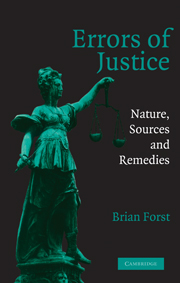Book contents
- Frontmatter
- Contents
- Preface
- Acknowledgments
- 1 The Problem
- 2 Errors of Due Process
- 3 Errors of Impunity
- 4 Frameworks for Analyzing the Incidence of Justice Errors
- 5 Assessing the Cost of Justice Errors
- 6 Standards of Evidence
- 7 Police-Induced Errors
- 8 Prosecution Policy and Justice Errors
- 9 The Jury
- 10 Sentencing and Corrections
- 11 Homicide
- 12 A Matter of Legitimacy
- Bibliography
- Index
- Titles in the series
4 - Frameworks for Analyzing the Incidence of Justice Errors
Published online by Cambridge University Press: 05 July 2011
- Frontmatter
- Contents
- Preface
- Acknowledgments
- 1 The Problem
- 2 Errors of Due Process
- 3 Errors of Impunity
- 4 Frameworks for Analyzing the Incidence of Justice Errors
- 5 Assessing the Cost of Justice Errors
- 6 Standards of Evidence
- 7 Police-Induced Errors
- 8 Prosecution Policy and Justice Errors
- 9 The Jury
- 10 Sentencing and Corrections
- 11 Homicide
- 12 A Matter of Legitimacy
- Bibliography
- Index
- Titles in the series
Summary
A mature science, with respect to the matter of errors in variables, is not one that measures its variables without error, for this is impossible. It is, rather, a science which properly manages its errors, controlling their magnitudes and correctly calculating their implications for substantive conclusions.
— Otis Dudley Duncan (1975)Introduction
We can begin the search for a system of managing errors in criminal justice by considering systems of error management in other domains. Several domains provide tools that have potential value as components of a system for managing justice errors. We focus here on two, with no presumption to have exhausted the relevant prospects. First is the domain of statistical inference, in which a logic and set of tools derived from that logic have been developed to test research hypotheses and estimate parameters of interest in such a way that is mindful of both random and systematic errors of inference. Second is that of quality control analysis, in which frameworks such as simulation modeling have been developed to manage errors in the production of goods and delivery of services. In Chapter 5, we will focus on a third, that of welfare economics and its concept of social costs, aimed at finding public policies and programs that minimize the sum of the cost of social harms and the cost of interventions designed to counter those harms.
- Type
- Chapter
- Information
- Errors of JusticeNature, Sources and Remedies, pp. 31 - 44Publisher: Cambridge University PressPrint publication year: 2003



